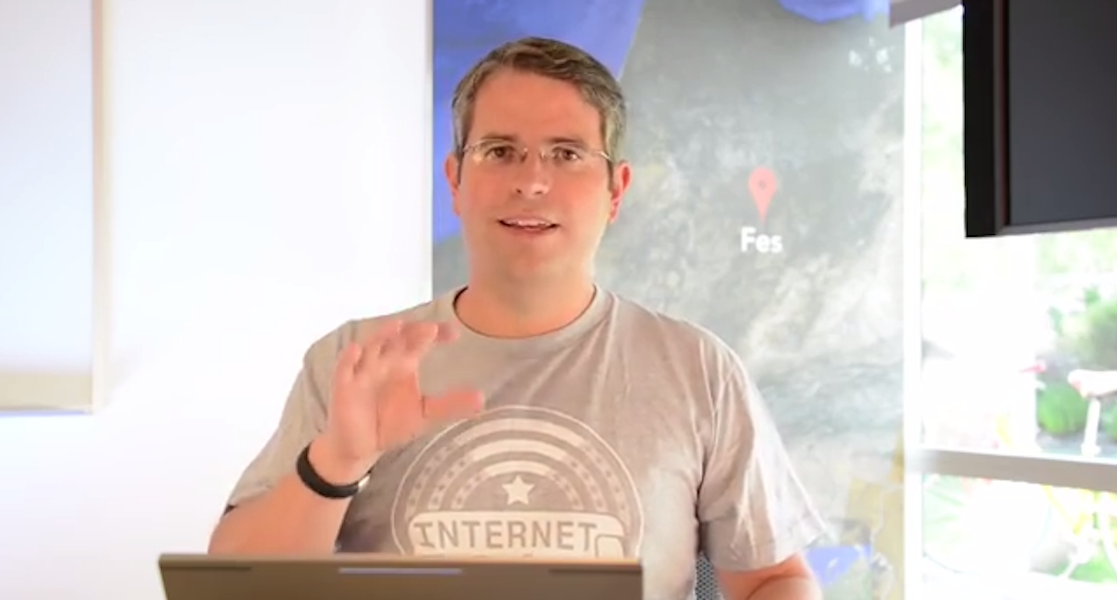Table Of Contents
Matt Cutts, Google’s head of search spam, recently published a new blog post: The decay and fall of guest blogging for SEO. In the post, he briefly touches on the history of guest posting. He starts dramatically with, “Okay, I’m calling it: if you’re using guest blogging as a way to gain links in 2014, you should probably stop.”
Cutts then explains, “Back in the day, guest blogging used to be a respectable thing.” He then gives an example of a low quality guest post outreach email that he received. Of all people, who would send a low quality guest post request to Matt Cutts asking for backlinks to their website anyways?
He cites Google’s quality guidelines, then goes on to say, “So stick a fork in it: guest blogging is done; it’s just gotten too spammy.” This statement is then followed by four Webmaster Tools videos. His article has sent shockwaves through the SEO community.
Cutts finishes his post with, “I just want to highlight that a bunch of low-quality or spam sites have latched on to “guest blogging” as their link-building strategy, and we see a lot more spammy attempts to do guest blogging. Because of that, I’d recommend skepticism (or at least caution) when someone reaches out and offers you a guest blog article.”
Don’t Freak Out
SEOs are going to overreact to this news. It’s already happening in the comment section of the article. Anytime there is a new Webmaster Tools video, or anytime Cutts posts to his blog, people overreact and read too far into the lines. And in my opinion, Cutts was a little over-dramatic in his post. Not all guest post backlinks will be punished, and here’s why:
Not everyone is abusing guest posts for backlinks.
If Google were going to punish all guest post backlinks, then they would have to punish all authors that have content published on Moz and other huge authority industry websites.
Moz accepts and promotes guest post articles, and the writer is able to obtain a link to their website. But they always promote high quality and relevant content. It’s natural to give credit to an author if the content submitted is high quality and great for users.
Therefore, bloggers with guest post links on authority websites like Moz will not need to worry about a guest post penalty, unless they are utilizing other spammy techniques.
But let’s take it one step further.
Let’s say a blogger wrote a fantastic article about link building and it was promoted on the Moz Blog with a backlink to his or her website.
Then, say that blogger wrote another killer, unique article about link building, and was featured on the Ahrefs Blog with a backlink to his or her website. Looks great.
This person is blogging for the right reasons, because they are collaborating, offering great high quality information, and their primary focus isn’t on obtaining a backlink.
Now, let’s say a different blogger has written an article about link building. This blogger mass emails 50 SEO blogs alerting them to this amazing new article, guaranteeing its uniqueness and telling each webmaster that the article will not be published anywhere else on the web.
Responses
However, this blogger might then get a handful of responses from different webmasters, all of whom are willing to post the article. They spin and tweak the content a few times, and submit what is essentially the same article to multiple blogs, claiming it is unique.
If the spun articles get posted with their backlinks—and in these cases, the blogger will almost always want a keyword-rich anchor text link—this looks unnatural, and can send red flags to Google that someone is actively building backlinks to their website using keyword-rich anchor text guest post backlinks.
Ok, so now what? What actionable advice can be taken away from this warning shot from Google?
Don’t Use Guest Posting as Your Sole Link Building Strategy
It sounds crazy, especially since guest posting has been all the rage over the past few years. And you can usually get guest post backlinks for free, along with the links of your choice to yours or your client’s website.
But as the saying goes, all good things must come to an end. When something is working in the SEO world, it will always attract spammers. And that’s exactly what Matt Cutts is pointing out with his blog post.
If you are using guest posting as a way to gain targeted keyword anchor text links, then you should stop immediately. You should instead start posting your high quality content on your own website. This, over time, will attract readers who will then naturally share and post backlinks to your content.
Use Branded Links When Guest Posting
If you are using guest posting as a way to build backlinks, be sure that your links are branded backlinks, especially if you receive DoFollow links in your author bio.
Instead of creating links in your author bio with keyword rich anchor text, such as “I am the author of the best SEO company,” create a branded link, like “I am the author of 847SEO.com.”
This is an easy way to avoid spammy anchor text links in your link profiles, and it looks more common and natural, too. That, and it sounds like it’s possible that targeted anchor text links in your guest post bios will hurt your website in the future, if not already.
Don’t Run a Mass Guest Post Link Building Campaign
Typically, guest post links are placed within an author bio at the end of the article. It would be very easy for Google to figure out a way to devalue those links that occur at the bottom of a page after an article—especially if you are using the same author description across multiple sites. Doing so leaves an obvious footprint, which Google’s algorithm could detect and use to classify your links as low quality.
With that being said, if you are building a large number of backlinks that are located underneath articles on a handful of different domains, especially if you’re using anchor text links, you should tread lightly—you might be in for a possible future penalty, which can be very difficult to remove.
Don’t Fear the NoFollow Link
If you are truly using guest posting in a legitimate way, you won’t care if the link you receive is a NoFollow backlink. In fact, you should encourage webmasters to NoFollow your guest post backlinks.
But why bother taking the time to create an amazing guest post article, all for a NoFollow backlink? Easy: you should be using guest posting as a way to raise brand awareness, get your name out to relevant readers, drive referral traffic to your website, and reach new readers that normally wouldn’t have seen your content—not to score a backlink.
You should be trying to guest post on high-traffic, high-authority sites. You want people to get to know your brand.
If you are using an SEO company or are planning to hire an SEO company that claims they will obtain a certain amount of links every month, especially if they claim to obtain a specific amount to guest post backlinks, you should think twice about the links they might get for you. They may be outsourcing their link building, and it could backfire and hurt your brand and website—especially since Google will probably be making some huge updates this year.
You Don’t Have to Stop Accepting Guest Posts
Do you accept and post guest articles on your own blog? Check back soon for tips for identifying, accepting and posting quality guest posts.





